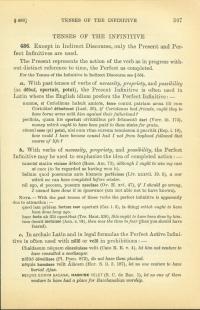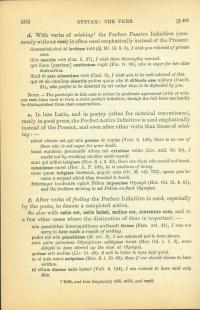486. Except in indirect discourse, only the present and perfect infinitives are used. The present represents the action of the verb as in progress without distinct reference to time, the perfect as completed. For the tenses of the nfinitive in indirect discourse see § 584.
a. With past tenses of verbs of necessity, propriety, and possibility (as dēbuī, oportuit, potuī), the present infinitive is often used in Latin where the English idiom prefers the perfect infinitive.
Numne, sī Coriolānus habuit amīcōs, ferre contrā patriam arma illī cum Coriolānō dēbuērunt. (Lael. 36)
If Coriolanus had friends, ought they to have borne arms with him against their fatherland?
pecūnia, quam hīs oportuit cīvitātibus prō frūmentō darī (Verr. 3.174)
money which ought to have been paid to these states for grain
Cōnsul esse quī potuī, nisi eum vītae cursum tenuissem ā pueritiā? (Rep. 1.10)
How could I have become consul had I not from boyhood followed that course of life?
b. With verbs of necessity, propriety, and possibility, the perfect infinitive may be used to emphasize the idea of completed action.
tametsī statim vīcissedēbeō (Rosc. Am. 73)
although I ought to win my case at once
(to be regarded as having won it)
bellum quod possumus ante hiemem perfēcisse (Liv. 37.19.5)
a war which we can have completed before winter
Nīl ego, sī peccem, possum nescīsse. (Ov. H. 16.47)
If I should go wrong, I cannot have done it in ignorance.
(am not able not to have known)
Note— With the past tenses of these verbs the perfect infinitive is apparently due to attraction.
quod iam prīdem factum esse oportuit (Cat. 1.5)
(a thing) which ought to have been done long ago.
haec facta ab illō oportēbat (Ter. Haut. 536)
This ought to have been done by him.
Tum decuit metuisse. (Aen. 10.94)
Then was the time to fear.
(then you should have feared)
c. In archaic Latin and in legal formulas the perfect active infinitive is often used with nōlō or volō in prohibitions.
Chaldaeum nēquem cōnsuluisse velit (Cato R. R. 5.4)
Let him not venture to have consulted a soothsayer.
Nōlītō dēvellisse (Pl. Poen. 872)
Do not have them plucked.
Nēquis humāsse velit Âiācem (Hor. S. 2.3.187)
Let no one venture to have buried Ajax.
NEIQVIS EORVM BACANAL HABVISE VELET (S. C. de Bac. 1)
Let no one of them venture to have had a place for Bacchanalian worship.
d. With verbs of wishing1 the perfect passive infinitive (commonly without esse) is often used emphatically instead of the present.
Domesticā cūrā tē levātum volō (Q. Fr. 3.9.3)
I wish you relieved of private care.
Illōs monitōs volō. (Cat. 2.27)
I wish them thoroughly warned.
quī illam [patriam] exstīnctam cupit (Fin. 4.66)
who is eager for her utter destruction
Illud tē esse admonitum volō. (Cael. 8)
I wish you to be well advised of this.
quī sē ab omnibus dēsertōs potius quam abs tē dēfēnsōs essemālunt (Caecil. 21)
who prefer to be deserted by all rather than to be defended by you
Note— The participle in this case is rather in predicate agreement (with or without esse) than used to form a strict perfect infinitive, though the full form can hardly be distinguished from that construction.
e. In late Latin, and in poetry (often for metrical convenience), rarely in good prose, the perfect active infinitive is used emphatically instead of the present, and even after other verbs than those of wishing.
Nēmō eōrum est quī nōn perīsse tē cupiat (Verr. 2.149)
There is no one of them who is not eager for your death.
Haud equidem premendō alium mē extulisse velim. (Liv. 22.59.10)
I would not exalt myself by crushing another.
Sunt quī nōlint tetigisse. (Hor. S. 1.2.28)
There are those who would not touch.
commīsisse cavet (Hor. A. P. 168)
he is cautious of doing
Nunc quem tetigisse timērent, anguis erās (Ov. M. 8.733)
Again you became a serpent which they dreaded to touch.
frātrēsque tendentēs opācō Pēlion imposuisse Olympō (Hor. Od. 3.4.51)
and the brothers striving to set Pelion on dark Olympus
f. After verbs of feeling the perfect infinitive is used, especially by the poets, to denote a completed action. So also with satis est, satis habeō, melius est, contentus sum, and in a few other cases where the distinction of time is important.
nōn paenitēbat intercapēdinem scrībendī fēcisse (Fam. 16.21)
I was not sorry to have made a respite of writing.
pudet mē nōn praestitisse (id. 14.3)
I am ashamed not to have shown
Sunt quōs pulverem Olympicum collēgisseiuvat (Hor. Od. 1.1.3)
Some delight to have stirred up the dust at Olympia.
Quiēsse erit melius (Liv. 3.48)
It will be better to have kept quiet.
ac sī quis amet scrīpsisse (Hor. S. 1.10.60)
than if one should choose to have written
Id sōlum dīxissesatis habeō. (Vell. 2.124)
I am content to have said only this.


